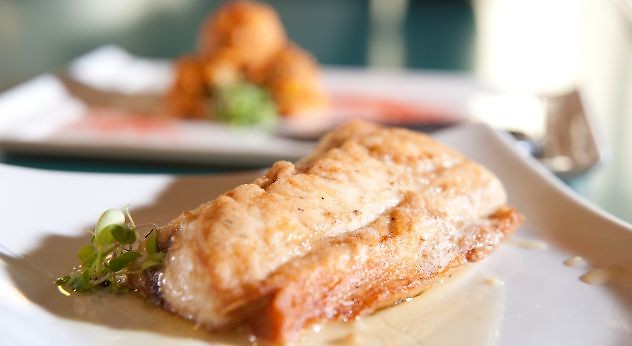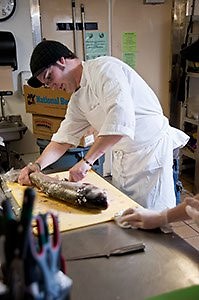The West Michigan Environmental Action Council and San Chez Bistro are putting Asian carp on the menu as part of an exclusive culinary event to benefit efforts to keep the notorious invasive species out of the Great Lakes.
FIGHT 'EM & FILLET 'EM will highlight efforts to keep the notorious invasive species out of West Michigan waterways as part of a fun, informative and tasty evening of adventurous eating and cocktails on Tuesday, November 30 from 6 – 9 p.m. at San Chez Bistro in Grand Rapids. Featured speakers include John Goss, Asian Carp Director at the Council on Environmental Quality, and Dan O’Keefe, Michigan Sea Grant Southwest District Extension Educator.
Asian carp are invasive species of fish found in the Mississippi River Basin that are rapidly making their way toward Lake Michigan via the Chicago Waterway System. Of concern in our region, are two species of fish native to Asia, commonly known as silver and bighead carp. These fish are voracious eaters that threaten the Great Lakes’ ecosystem by outcompeting other plankton-feeding aquatic species at the bottom of the food chain, with the potential to negatively impact recreational and commercial fisheries and the industries that depend on them. Commonly associated with widely circulated videos of “flying” or “attack” fish, Asian carp can weigh up to 100 pounds and have been known to leap out of the water when disturbed by boats, a threat to boaters, water skiers and equipment.
Widely described as a cross between crab meat and scallops, Asian carp are earning solid reviews from chefs throughout the Mississippi River Basin, where state leaders are attempting to rebrand the fish as "Silverfin" or "Kentucky Tuna" in an effort to thin their population and keep local fishermen working. From a biological standpoint, Asian carp are quite different from common carp, which are bottom feeders.
“Although I hear it’s delicious, I don’t think anyone would like to see Asian carp as the catch of the day in West Michigan waters,” said WMEAC Executive Director Rachel Hood. “This is a way to draw awareness to the threat of Asian carp and other invasive species to Lake Michigan and West Michigan’s waterways...and to have a good time doing it.”
San Chez is now experimenting with the fish and will have a draft menu available the week of the event. Owner Dan Gendler indicated that the menu will include both mainstream dishes prepared from Asian carp and a few outlandish items designed to highlight how important it is to aggressively address the invasive species issue. From a culinary perspective, he highlighted the threat to menu diversity if invasive species such as Asian carp were to overtake salmon, trout or whitefish.
“We’re trying to put together a menu that captures how we feel about this issue,” said Gendler. “I watch these videos of Asian carp leaping out of the Mississippi River and think of how absurd it would be for us to allow that to ever happen in the Great Lakes. It makes me think of carp and garlic gelato or bacon and chocolate-wrapped carp, something off the wall. We need a real attention-getter to help drive home the need for permanent ecological separation.”
Hood said WMEAC and its members support permanent ecological separation of the Great Lakes from the Chicago Waterway System. She indicated that it is important for Michigan’s elected officials, business and community leaders, and citizens to be aware of and involved in the process to determine how best to accomplish that.
Goss will speak on the federal government’s proactive response to the threat that Asian carp poses to the Great Lakes. In his role, he oversees the coordination of federal, state, and local efforts to keep Asian carp from establishing in the Great Lakes ecosystems. Goss chairs the Asian Carp Regional Coordinating Committee, which is a team of federal, state and local agencies working together to prevent Asian carp from establishing populations in the Great Lakes.
Last week, the U.S. Army Corps of Engineers announced it is embarking on a four-year, $25 million study on how to stop the migration of invasive species between the Great Lakes and the Mississippi River basin. WMEAC and its members are disappointed by the timetable proposed in this announcement and support an accelerated study to produce a long-term solution within 12 to 18 months, as called for in the federal lawsuit recently filed by Michigan, Wisconsin, Ohio, Minnesota and Pennsylvania against the Corps. The Great Lakes fishing industry is worth some $7 billion annually to the Midwest economy.
Learn more about the event at fightasiancarp.org or the WMEAC Facebook page. A $40 donation is requested for diners. Non-fish and vegetarian entrees will also be served. San Chez is located at 38 Fulton Street West in downtown Grand Rapids.
Event Details
Name: FIGHT ‘EM & FILLET ‘EM!
Date/Time: Tuesday, November 30, 6-9pm
Location: San Chez Bistro, Third Floor, 38 Fulton Street West in downtown Grand Rapids
Summary: FIGHT 'EM & FILLET 'EM will highlight efforts to keep the notorious invasive species out of West Michigan waterways as part of a fun, informative and tasty evening of adventurous eating and cocktails on Tuesday, November 30 from 6 – 9 p.m. at San Chez Bistro in Grand Rapids. Featured speakers include John Goss, Asian Carp Director at the Council on Environmental Quality, and Dan O’Keefe, Michigan Sea Grant Southwest District Extension Educator.
The Rapidian, a program of the 501(c)3 nonprofit Community Media Center, relies on the community’s support to help cover the cost of training reporters and publishing content.
We need your help.
If each of our readers and content creators who values this community platform help support its creation and maintenance, The Rapidian can continue to educate and facilitate a conversation around issues for years to come.
Please support The Rapidian and make a contribution today.



